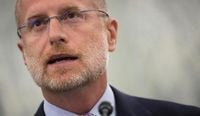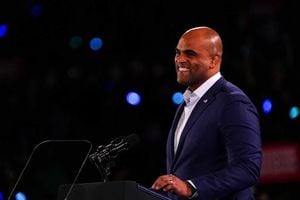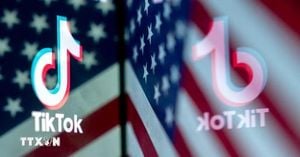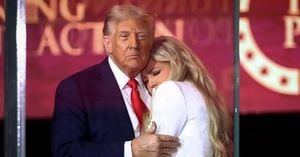The intersection of politics, media, and free speech in the United States has rarely been more contentious than in the aftermath of the recent suspension of late-night comedian Jimmy Kimmel. The controversy, which erupted after Kimmel criticized conservative figures in the wake of Charlie Kirk’s murder, has drawn in top regulators, media conglomerates, and some of the most prominent figures in American politics—including President Donald Trump and several leading Republican senators.
It all began on September 15, 2025, when Kimmel, during his monologue, accused the so-called “MAGA gang” of “desperately trying to characterize this kid who murdered Charlie Kirk as anything other than one of them and doing everything they can to score political points from it.” The remarks, aired on his popular late-night show, instantly sparked outrage among conservatives and triggered a cascade of corporate and regulatory responses.
Within days, Brendan Carr, the Trump-appointed chair of the Federal Communications Commission (FCC), appeared on a rightwing podcast and issued a stark warning to ABC and its parent company, Disney. “We can do this the easy way or the hard way,” Carr said, denouncing Kimmel’s comments as “truly sick” and reminding the companies that their broadcast licenses are granted by the FCC and come with an “obligation to operate in the public interest.” According to The Guardian, Carr’s warning was explicit: remove Kimmel or face regulatory consequences.
The threat had immediate repercussions. On September 17, Nexstar Media Group—which owns 32 ABC affiliate stations and is pursuing a $6.2 billion merger with Tegna that requires FCC approval—announced it would pre-empt Kimmel’s show “for the foreseeable future.” Sinclair Broadcasting, the nation’s largest ABC affiliate group, followed suit and demanded an apology from Kimmel to Kirk’s family. Disney-owned ABC, under mounting pressure, pre-empted Kimmel’s show indefinitely, a move that set off a new wave of backlash among those who felt the media giant had caved to political pressure.
Senator Rand Paul of Kentucky was quick to weigh in. In an interview with NBC’s Meet the Press on September 21, Paul called Carr’s remarks “absolutely inappropriate.” He argued, “Brendan Carr has got no business weighing in on this. But people have to also realize that despicable comments, you have the right to say them. But you don’t have the right to employment.” Paul underscored that employment decisions should be business matters, not government interventions, and warned, “The government’s got no business in it. And the FCC was wrong to weigh in. And I’ll fight any attempt by the government to get involved with speech, I will fight.”
Senator Ted Cruz of Texas echoed Paul’s concerns, albeit with his own characteristic candor. On his podcast, “Verdict with Ted Cruz,” Cruz said he “hates what Kimmel said” and was “thrilled that he was fired,” but he likened Carr’s threat to something a “mafioso” would say. Cruz warned, “There will come a time when a Democrat wins again, wins the White House. They will get rid of everything America that’s conservative. They’ll get rid of every podcast. They’ll get rid of everything. They will silence us. They will use this power and they will use it ruthlessly and that is dangerous.”
While some conservatives applauded the FCC’s actions, others, including political commentator Tucker Carlson, voiced fears that the incident would be used to justify restrictive hate speech laws. Carlson stated his hope that Kirk’s murder “won’t be leveraged to bring hate speech laws to this country.”
Not all Republicans, however, opposed Carr’s aggressive stance. Representative Chip Roy of Texas told NBC that the FCC is right to scrutinize broadcast networks regarding their licenses. Senator Cynthia Lummis of Wyoming, speaking to Semafor, went further, suggesting that a broadcasting license is a privilege, not a right. “Under normal times, in normal circumstances, I tend to think that the First Amendment should always be sort of the ultimate right. And that there should be almost no checks and balances on it,” she said. “I don’t feel that way anymore. I feel like something’s changed culturally. And I think that there needs to be some cognizance that things have changed.”
Meanwhile, Democrats and free speech advocates have sounded the alarm about what they see as an unprecedented assault on the First Amendment. Anna Gomez, the last surviving Democrat on the FCC board, was blunt in her criticism. She accused the Trump administration of encouraging “an inexcusable act of political violence to be twisted into a justification for government censorship and control.” Gomez added, “This FCC does not have the authority, the ability, or the constitutional right to police content or punish broadcasters for speech the government dislikes.” She also condemned ABC and Disney’s compliance, calling it “a shameful show of cowardly capitulation” that has “put the foundation of the first amendment in danger.”
Connecticut Senator Chris Murphy, a leading Democratic voice in Congress, accused Trump of using Kirk’s death as a pretext to silence critics and tighten control over the media. “They aren’t even hiding what they are trying to do,” Murphy said. “Any media actor that doesn’t say what Trump wants them to say… is going to be silenced. That’s censorship. That’s state speech control. That’s not America.”
The controversy has also exposed deep divisions within the media industry itself. Former FCC officials described the current climate as “chilling,” with many companies seeking legal advice and treading carefully, especially those with business before the FCC. One CBS employee told The Guardian that the industry’s capitulation to political pressure has created “despair,” noting, “Each capitulation makes it harder for the next company targeted to stand up to him [Trump].”
President Trump, for his part, has made no secret of his support for Carr’s approach. Speaking to reporters aboard Air Force One on September 18, Trump said, “They give me only bad press, and they’re getting a licence. I would think maybe their licence should be taken away. It will be up to Brendan Carr.” Trump has also launched lawsuits against major media outlets and pressured companies to alter their editorial and diversity policies, with some—including ABC and CBS—reportedly paying multimillion-dollar settlements.
Brendan Carr’s rise within the FCC has been marked by a steady shift from free speech advocacy to wielding regulatory power as a tool against perceived media bias. His earlier statements, such as “The FCC should promote freedom of speech,” now stand in stark contrast to his recent actions. Former colleagues say they are “stunned” by what they describe as the agency’s turn towards “outright censorship.”
As the debate rages on, one thing is abundantly clear: the battle over free speech, media independence, and government power in America has entered a new—and deeply uncertain—chapter.






